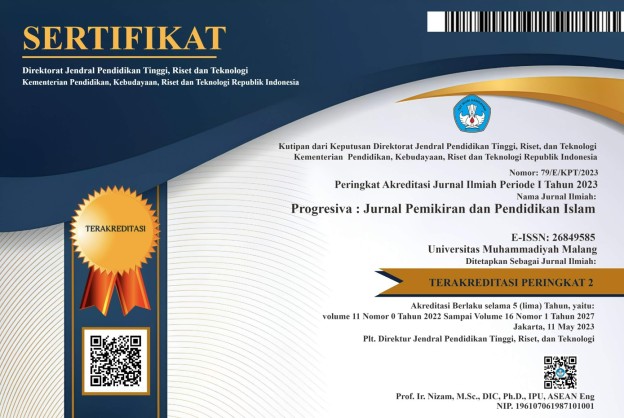Advancing Tolerance Through Islamic Religious Education for Muslim Minorities in Hindu-Majority Communities
DOI:
https://doi.org/10.22219/progresiva.v13i03.37054Keywords:
Education, Islamic Minority, Hinduism, ToleranceAbstract
This research is encouraged by the many conflicts in a society represented by the majority-minority and religion, leading to acts of violence, moral crises, and anarchism. Therefore, many parties then developed the role of education, especially Islamic education, amid non-Muslim communities. So, it is essential to analyze the behavior of the Muslim minority amid the Balinese Hindu majority community. How is the content and provision of the values of tolerance at the Bali Bina Insani Islamic Boarding School as a model of religious moderation? The purpose of this research is to analyze, test, and describe the life of a Hindu-majority society that is moderate towards Muslim minorities and, conversely, the development of Islamic values in the form of tolerance at the Bali Bina Insani Islamic Boarding School towards minority Hindu teachers and employees in it. This research shows that despite a Muslim minority in an Islamic boarding school entity amidst a Hindu majority, there are no acts of intolerance. And vice versa, even though there are teachers and employees at the Islamic boarding school who are Hindus (as a minority), they are still given rights that are by work professionalism, and there is no discrimination against them.
Downloads
References
Abdulhamed, R., Lonka, K., Hietajärvi, L., Ikonen, R., & Klemetti, R. (2022). Anxiety and depression symptoms and their association with discrimination and a lack of social support among first- and second-generation immigrant adolescents. International Journal of Intercultural Relations, 87(March 2021), 193–205. https://doi.org/10.1016/j.ijintrel.2022.03.001
Anak Agung Ketut Suryahadi. (2009). The Art of Ritual Pawiwahan in Bali. Graduate School UGM.
ANDREI FLORESCU. (2000). WHY CONSERVATIVE VALUES INHERITED FROM PREVIOUS GENERATIONS WILL CONTINUE TO SHAPE CONTEMPORARY IDENTITY? Journal for the Study of Religions and Ideologies, 19(56), 46–62.
Ardi, R., Tobing, D. H., Agustina, G. N., Iswahyudi, A. F., & Budiarti, D. (2021). Religious schema and tolerance towards alienated groups in Indonesia. Heliyon, 7(7), e07603. https://doi.org/10.1016/j.heliyon.2021.e07603
Bolandhematan, K. (2019). Spiritual Education in Islamic Tradition: Revisiting Ghazali’s “Deliverance.” J, 114(2). https://doi.org/10.1080/00344087.2018.1560585
Creswell, J. W. (2012). Research Design Pendekatan Kualitatif, Kuantitatif, dan Mixed. Pustaka Pelajar.
Dauda, K. O. (2021). Islamophobia and religious intolerance: Threats to global peace and harmonious co-existence. Qudus International Journal of Islamic Studies, 8(2), 257–292. https://doi.org/10.21043/qijis.v8i2.6811
Djelantik, A. A. A. M. J., Aryani, P., Boelen, P. A., Lesmana, C. B. J., & Kleber, R. J. (2021). Prolonged grief disorder, posttraumatic stress disorder, and depression following traffic accidents among bereaved Balinese family members: Prevalence, latent classes and cultural correlates. Journal of Affective Disorders, 292, 773–781. https://doi.org/10.1016/j.jad.2021.05.085
Fahmi, M. (2019). Pendidikan Multikultural Sebagai Strategi Adaptasi Pesantren Bali Bina Insani di Daerah Minoritas Muslim Tabanan Bali. Universitas Islam Negeri Sunan Ampel.
Falikul Isbah, M. (2020). Pesantren in the changing indonesian context: History and current developments. Qudus International Journal of Islamic Studies, 8(1), 65–106. https://doi.org/10.21043/QIJIS.V8I1.5629
Hadi, M. F., & Mu’ammar, M. A. (2020). Multicultural and Citizenship: Reconstruction of Indonesia Islamic Thought. 436(Advances in Social Science, Education and Humanities Research), 1129–1133. https://doi.org/10.2991/assehr.k.200529.237
Hana, Y., Tau, A., Sae, M., Ikhsan, M. A., Nur, T., Thoriquttyas, T., & Khoirul, F. (2021). Heliyon The new identity of Indonesian Islamic boarding schools in the “ new normal ” : the education leadership response to COVID-19. Heliyon, 7(March), 1–10. https://doi.org/10.1016/j.heliyon.2021.e06549
Hanafi, Y., Taufiq, A., Saefi, M., Ikhsan, M. A., Diyana, T. N., Thoriquttyas, T., & Anam, F. K. (2021). The new identity of Indonesian Islamic boarding schools in the “new normal”: the education leadership response to COVID-19. Heliyon, 7(3), e06549. https://doi.org/10.1016/J.HELIYON.2021.E06549
Harjatanaya, T. Y., & Hoon, C. Y. (2020). Politics of multicultural education in post-Suharto Indonesia: a study of the Chinese minority. Compare, 50(1). https://doi.org/10.1080/03057925.2018.1493573
Hastasari, C., Setiawan, B., & Aw, S. (2022). Students’ communication patterns of islamic boarding schools: the case of Students in Muallimin Muhammadiyah Yogyakarta. Heliyon, 8(1), e08824. https://doi.org/10.1016/j.heliyon.2022.e08824
Ho, M. K., MacGlashan, J., Littman, M. L., & Cushman, F. (2017). Social is special: A normative framework for teaching with and learning from evaluative feedback. Cognition, 167, 91–106. https://doi.org/10.1016/j.cognition.2017.03.006
Hummelstedt, I. P., Holm, G. I. M., Sahlström, F. J., & Zilliacus, H. A. C. (2021). Diversity as the new normal and persistent constructions of the immigrant other – Discourses on multicultural education among teacher educators. Teaching and Teacher Education, 108. https://doi.org/10.1016/j.tate.2021.103510
I Gst. Pt. Bagus Suka Arjawa, Z. (2021). The Social Integration of Hindu and Muslim Communities: The Practice of “Menyama-Braya” in Contemporary Bali. Studia Islamika, 28(1), 149–178. https://doi.org/10.36712/sdi.v28i1.10914
I ketut Wiana. (2006). Menyayangi Alam Wujud Bhakti Pada Tuhan. Paramita.
I Wayan Gede Astawa Karang, Alemarie Ceria, J. L. (2021). Detecting religion from space: Nyepi Day in Bali. Remote Sensing Applications: Society and Environment, 24. https://doi.org/https://doi.org/10.1016/j.rsase.2021.100608
Ketut, I., & Harsana, G. (n.d.). THE EXISTENCE OF DEEP BALINESE CULTURE HINDU THEOLOGICAL PERSPECTIVE. https://doi.org/10.37118/ijdr.26792.05.2023
Kokarevich, M. N., & Sizova, N. Z. (2015). Model of Tolerance of Intercultural Communication. Procedia - Social and Behavioral Sciences, 166, 621–625. https://doi.org/10.1016/j.sbspro.2014.12.584
Kosson, D. S., Chi, T., Riser, N. R. E., Walsh, Z., Beussink, C. N., Pera-Guardiola, V., & Briz, A. J. (2019). Facial affect recognition in college students with psychopathic traits: A comparison using tests matched in discriminating power. Journal of Research in Personality, 78, 52–60. https://doi.org/10.1016/j.jrp.2018.11.002
Lorenz, E., Krulatz, A., & Torgersen, E. N. (2021). Embracing linguistic and cultural diversity in multilingual EAL classrooms: The impact of professional development on teacher beliefs and practice. Teaching and Teacher Education, 105, 103428. https://doi.org/10.1016/j.tate.2021.103428
Made Dewi Sariyani, Kadek Sri Ariyanti, L. N. U. (2020). The relationship of parity and patriarchal culture with unmet need for family planning of eligible women in Gadungan Village, Selemadeg Timur District, Tabanan Bali in 2019. Enfermería Clínica, 30(7), 26–29. https://doi.org/https://doi.org/10.1016/j.enfcli.2020.07.005
Mailana, S. dan A. (2019). Teori pendidikan behavioristik pembentukan karakter masyarakat muslim dalam tradisi Ngejot di Bali. Ta’dibuna: Jurnal Pendidikan Islam, 8(2), 163–176. https://doi.org/10.32832/tadibuna.v8i2.2233
Maimun, A., Indiyanto, A., & Mujab, M. (2020). Educating islamic values through wiwitan tradition. Journal of Indonesian Islam, 14(2), 359–386. https://doi.org/10.15642/JIIS.2020.14.2.359-386
Majid, A. (2012). Belajar dan Pembelajaran Pendidikan Agama Islam. Remaja Rosdakarya.
Malaklolunthu, S., & Rengasamy, N. C. (2011). School redesign for fostering multiculturalism in Malaysia: Augmenting the “Vision School.” Procedia - Social and Behavioral Sciences, 15, 84–88. https://doi.org/10.1016/j.sbspro.2011.03.056
McNally, C., Zaidi, A. N., Murthy, R., & Love, B. A. (2022). Finding “Harmony” Between a Patient’S Religious Beliefs and Medical Needs: Transcatheter Pulmonary Valve Replacement in a Jehovah’S Witness Patient. Journal of the American College of Cardiology, 79(9), 2189. https://doi.org/10.1016/s0735-1097(22)03180-1
MichelleTan, Y. S., & S.Caleon, I. (2022). “It’s not just about grades”: Teachers’ alternative perceptions of students performing at a low level and of these students’ academic success. Teaching and Teacher Education, 118. https://doi.org/https://doi.org/10.1016/j.tate.2022.103816
Mohd Khalli, M. N., Sintang, S., & Kamu, A. (2022). The framework of socio-religious harmony in Sabah, East Malaysia: An application of Fuzzy Delphi method. Heliyon, 8(8), e09976. https://doi.org/10.1016/j.heliyon.2022.e09976
Moleong, L. J. (2018). Metodologi Penelitian Kualitatif (Revisi). Remaja Rosdakarya.
Nejad, A. A., Yaghoubi, N. M., Doaei, H., & Rowshan, S. A. (2016). Exploring the Dimensions and Components of Islamic Values Influencing the Productivity of Human Resources from the Perspective of Mashhad Municipality Employees. Procedia - Social and Behavioral Sciences, 230(May), 379–386. https://doi.org/10.1016/j.sbspro.2016.09.048
Nessipbayeva, O. (2013). Spiritual-Moral Nurture of the Person through Folk Pedagogy. Procedia - Social and Behavioral Sciences, 93, 1722–1729. https://doi.org/10.1016/j.sbspro.2013.10.106
Omar, A. (2019). Ibn Rushd’s The Decisive Treatise: A Text for Political Reform. Medieval History Journal, 22(1). https://doi.org/10.1177/0971945818801398
Paul-Binyamin, I., & Reingold, R. (2014). Multiculturalism in teacher education institutes - The relationship between formulated official policies and grassroots initiatives. Teaching and Teacher Education, 42, 47–57. https://doi.org/10.1016/j.tate.2014.04.008
Putra, P. S. (2021). Merajut Harmoni Dan Menuai Damai Hindu-Islam di Ponpes Bali Bina Insani Tabanan. Suarabali.Id, 1.
Qurrat, A. (2022). A HISTORICAL NARRATIVE OF ETHNIC CONFLICT AND SOCIAL ANARCHY IN SHAANXI : THE MUSLIM UPRISING 1862-1873 China . We suggest that these grievances played a significant but aid of Mongols in usurpation of China and dominance over identity enforcing accultura. 10(1), 109–140.
Rachmawati. (2021, October 12). Kilas Balik Bom Bali 2002, 19 Tahun Silam Ledakan Dahsyat Guncang Kuta dan Denpasar. Kompas.Com, 1–5.
Rahardjo, D. (1985). Pergulatan Dunia Pesantren Dari Bawah. P3M.
Rodríguez García, J. A. (2019). Islamic religious education and the plan against violent radicalization in Spain. British Journal of Religious Education, 41(4). https://doi.org/10.1080/01416200.2018.1484693
Saada, N., & Gross, Z. (2017). Islamic education and the challenge of democratic citizenship: a critical perspective. J, 38(6). https://doi.org/10.1080/01596306.2016.1191011
Santoso, M. A. F., & Khisbiyah, Y. (2021). Islam-based peace education: Values, program, reflection and implication. Indonesian Journal of Islam and Muslim Societies, 11(1), 185–207. https://doi.org/10.18326/IJIMS.V11I1.185-207
Sarah Hall, Chantel Sloan-Aagard, Ron Harris, Chad Emmett, Carolus Prasetya dicJessica Pettersson, Amelia Cope, M. H. C. (2022). Perceptions of tsunami susceptibility and self-efficacy among adolescents in Indonesia: The influence of gender, religion, location, age, hazard information source, and past experience. International Journal of Disaster Risk Reduction, 79. https://doi.org/https://doi.org/10.1016/j.ijdrr.2022.103151
Saville, R., & Mahbubi, A. (2021). Assessing Muslim travellers’ preferences regarding food in Japan using conjoint analysis: An exploratory study on the importance of prayer room availability and halalness. Heliyon, 7(5), e07073. https://doi.org/10.1016/j.heliyon.2021.e07073
Schmidt, S. K., Bratland-Sanda, S., & Bongaardt, R. (2022). Young adolescents’ lived experience with teacher-led classroom-based physical activity: A phenomenological study. Teaching and Teacher Education, 116, 103777. https://doi.org/10.1016/j.tate.2022.103777
Sinatra, A. M., Pollard, K. A., Files, B. T., Oiknine, A. H., Ericson, M., & Khooshabeh, P. (2021). Social fidelity in virtual agents: Impacts on presence and learning. Computers in Human Behavior, 114(September 2020), 106562. https://doi.org/10.1016/j.chb.2020.106562
Soemartono, T. (2014). Reconstruction of Education Policy in Jembrana Bali, Best Practices of Creative and Innovative Leadership Using Soft Systems Methodology based Action Research. Procedia - Social and Behavioral Sciences, 115(Iicies 2013), 269–282. https://doi.org/10.1016/j.sbspro.2014.02.435
Stolberg, T. L. (2008). Understanding the approaches to the teaching of religious education of pre-service primary teachers: The influence of religio-scientific frameworks. Teaching and Teacher Education, 24(1), 190–203. https://doi.org/10.1016/j.tate.2007.01.001
Sudira, A. H. & P. (2013). PENANAMAN NILAI-NILAI KARAKTER SISWA KAJEN MARGOYOSO PATI JAWA TENGAH. Jurnal Pendidikan Vokasi, 3(2), 138–152. https://doi.org/https://doi.org/10.21831/jpv.v3i2.1592
Suradi, A. (2018). PENDIDIKAN MULTIKULTURAL DI SEKOLAH. Jurnal Pendidikan Agama Islam, 6(1), 25–43. https://doi.org/https://doi.org/10.15642/jpai.2018.6.1.25-43
Szelei, N., Tinoca, L., & Pinho, A. S. (2019). Rethinking ‘cultural activities’: An examination of how teachers utilised student voice as a pedagogical tool in multicultural schools. Teaching and Teacher Education, 79, 176–187. https://doi.org/10.1016/j.tate.2018.12.020
Thajib, F. (2017). Kaleidoscopic feelings: Faith narratives among Indonesian Muslim Queers. Emotion, Space and Society, 25, 127–135. https://doi.org/10.1016/j.emospa.2016.11.007
Thomassen, W. E., & Munthe, E. (2020). A Norwegian perspective: Student teachers’ orientations towards cultural and linguistic diversity in schools. Teaching and Teacher Education, 96, 103151. https://doi.org/10.1016/j.tate.2020.103151
Vadeboncoeur, J. A., Panina-Beard, N., & Vellos, R. E. (2021). Moral imagining in student-teacher relationships in alternative programs: Elaborating a theoretical framework. Learning, Culture and Social Interaction, 30(xxxx), 100470. https://doi.org/10.1016/j.lcsi.2020.100470
Vanner, C., Holloway, A., & Almanssori, S. (2022). Teaching and learning with power and privilege: Student and teacher identity in education about gender-based violence. Teaching and Teacher Education, 116, 103755. https://doi.org/10.1016/j.tate.2022.103755
Warsah, I., Masduki, Y., Imron, Daheri, M., & Morganna, R. (2019). Muslim minority in Yogyakarta: Between social relationship and religious motivation. Qudus International Journal of Islamic Studies, 7(2), 367–398. https://doi.org/10.21043/qijis.v7i2.6873
Widiastuti, N. P. E., Sukoharsono, E. G., Irianto, G., & Baridwan, Z. (2015). The Concept of Gratitude from the SMEs Owners in Bali to Address the Income Tax Evasion. Procedia - Social and Behavioral Sciences, 211, 761–767. https://doi.org/10.1016/j.sbspro.2015.11.101
Williamsson, J., Schaad, G., & Sandoff, A. (2022). Building legitimacy for sustainable business schools: Using the business model concept when teaching corporate sustainability. Journal of Cleaner Production, 367(January 2021), 133116. https://doi.org/10.1016/j.jclepro.2022.133116
Zhang, L. C., & Nouri, J. (2019). A systematic review of learning computational thinking through Scratch in K-9. Computers and Education, 141. https://doi.org/10.1016/j.compedu.2019.103607
Published
How to Cite
Issue
Section
License
Copyright (c) 2024 Muhammad Fazlurrahman Hadi, Usbani

This work is licensed under a Creative Commons Attribution-ShareAlike 4.0 International License.

















